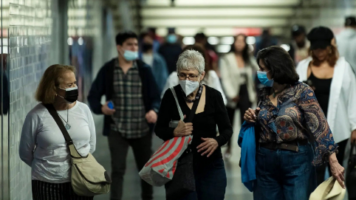COVID-19 News
COVID-19 Update | February 24, 2023
February 24, 2023

COVID-19 Update | February 24, 2023
The California Biotechnology Foundation is committed to keeping you up to date about COVID-19 testing, treatment and prevention advancements. The following resources track what progress has been made as of February 24, 2023. Notable advancements include:
- The National Institute for Health and Care Excellence has recommended Pfizer’s Paxlovid, GSK’s Xevudy and Roche’s RoActemra for use as treatments for COVID-19 treatments in adults.
- The diabetes treatment metformin has been linked to a reduction in COVID-19 viral load, contributing to the treatment’s positive impacts on fighting infection.
- Children 6 months to 4 years of age benefit from 3 doses of the Pfizer-BioNTech COVID-19 vaccine according to a new study from The New England Journal of Medicine.
Recent News
- How physicians can address COVID-19 vaccine booster fatigue
American Medical Association – February 22, 2023
For nearly three years now, there has been nonstop discussion and emphasis on the importance of COVID-19 vaccines and boosters. With many people developing COVID-19 booster fatigue, physicians must find ways to break through without adding further burden on their patients. Much like pandemic fatigue, this phenomenon is defined as unwillingness or inaction towards vaccine information or instruction due to perceived burden or burnout. In turn, patients are slow to line up for their COVID-19 bivalent boosters even as the highly transmissible XBB.1.5 Omicron subvariant has become the dominant strain of SARS-CoV-2 in the U.S. To date, only 15.8% of the U.S. population have received an updated bivalent booster dose. - Do clinicians really need to diagnose long COVID-19? We asked the experts
Fierce Healthcare – February 21, 2023
Researchers are working to produce generally agreed upon best diagnostic and treatment protocols for long COVID-19, which is a growing concern. However, most of the symptoms long COVID-19 patients experience already have diagnostic and treatment protocols. For example, a patient may seek out care for a heart problem that may or may not have been caused by long COVID-19. The physicians already know the best way to treat it. The insurance companies will or will not cover that treatment depending on the benefits package. - Trio of COVID-19 treatments receive NICE nod
PharmaTimes – February 21, 2023
The National Institute for Health and Care Excellence’s (NICE’s) final draft guidance has recommended three COVID-19 treatments as options for adults. They are Pfizer’s Paxlovid, GSK’s Xevudy and Roche’s RoActemra. The Paxlovid, Xevudy and RoActemra therapies were recommended because there was evidence suggesting they are effective in treating COVID-19. Furthermore, these treatments were found to be cost-effective. - Metformin Linked to Reductions in COVID-19 Viral Load
MedScape – February 21, 2023
Treatment with the diabetes drug metformin shows a significant, dose-dependent effect in lowering COVID-19 viral load within days of administration, according to the latest analysis of a phase 3 trial. These findings add to a multitude of benefits the drug has been shown to have in COVID infection. - Young Children Benefit from 3 Doses of Pfizer-BioNTech COVID-19 Vaccine
Drug Topics – February 21, 2023
A three-dose primary series of the Pfizer-BioNTech COVID-19 vaccine was found to be safe, immunogenic, and efficacious in children 6 months to 4 years of age, according to a new study. The study’s results were published in The New England Journal of Medicine.1 Overall, a vaccine efficacy of 73.2% was observed in individuals 6 months to 4 years of age. In children ages 6 months to less than 2 years of age, the vaccine demonstrated a 75.8% efficacy, and among children 2 to 4 years of age it was 71.8% efficacious. - Previous COVID-19 may slash severe illness at reinfection by 89%
CIDRAP – February 20, 2023
The risk of COVID-19 hospitalization among previously infected adults is 89% to 90% lower for at least 10 months than for their never-infected peers, according to a meta-analysis published late last week in The Lancet. In the largest meta-analysis on the extent of infection-conferred protection against four SARS-CoV-2 strains, the COVID-19 Forecasting Team analyzed 65 studies from 19 countries published up to Sep 30, 2022, that estimated the risk of infection-related hospitalization among participants who had or hadn’t had a previous case. - Research examines antibiotic use during COVID-19 by age
News Medical Life Sciences – February 20, 2023
In a research letter published in JAMA Health Forum, researchers evaluated antibiotic prescriptions during severe acute respiratory syndrome coronavirus 2 (SARS-CoV-2) infection-associated health visits in outpatient settings by United States (US) residents aged ≤64 years who have commercial health insurance. The coronavirus disease 2019 (COVID-19) pandemic has caused unprecedented morbidity and mortality across the globe. A considerable proportion of outpatient SARS-CoV-2 infection-associated visits among Medicare-insured individuals result in antibiotic prescribing. Analyzing COVID-19-associated antibiotic prescribing could inform antibiotic stewardship policies and programs. - New treatment for COVID-19 is made from plants
Arizona State University News – February 20, 2023
Viruses, including SARS-CoV-2, use an extensive arsenal to help them cleverly evade the immune system, proliferate and cause disease. Among their formidable weapons is the ability to ceaselessly mutate, developing new variants that the body’s natural or vaccine-induced defenses cannot fight. In new research, Shawn Chen, a researcher with Arizona State University’s Biodesign Center for Immunotherapy, Vaccines and Virotherapy and School of Life Sciences, describes an innovative therapy for COVID-19. The method highlighted in the study uses transient expression in tobacco plants to develop and produce a monoclonal antibody, or mAb. The crucial advantage of the therapy is that it may protect against COVID-19, even as the virus attempts to evade immune detection through mutation.
Rely on California Biotechnology Foundation to monitor breaking news and provide updates on the latest advancements in COVID-19 diagnostics, vaccines and treatments.
Stay informed on the latest news and trends on the economic and health benefits of this industry by visiting the new CABiotech.org
If you have any questions about informational briefings contact California Biotechnology Foundation Executive Director Patty Cooper at (916)764-2434 or [email protected].


